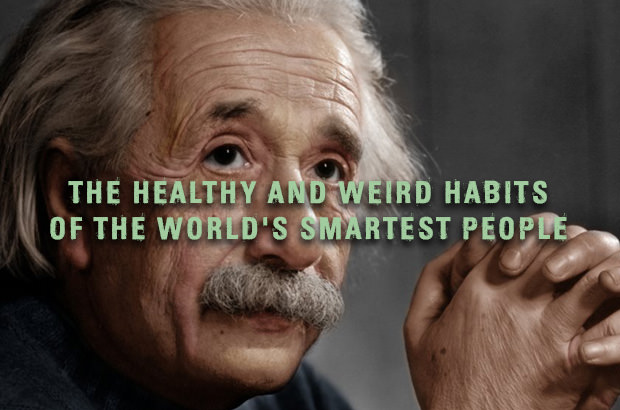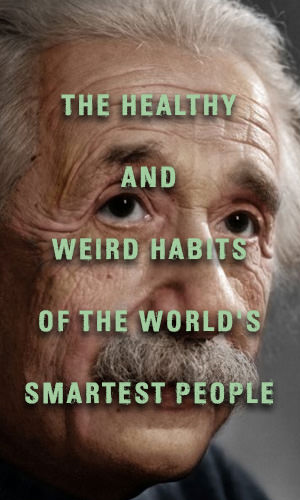
The Healthy And Weird Habits Of The World's Smartest People

Posted on 14 Nov, 2022

The puny-dork stereotype is just that: a fiction perpetuated by popular culture. Sure, some intellectuals are physically weak and have no interest in working out. But there are just as many who are athletic and focused on health, recognizing the important role physical vigor plays in maintaining and increasing intellectual stamina.
Aside from creating works of art, developing groundbreaking inventions or scientific breakthroughs or simply being one of the best at what they do, the smartest among us are still merely human — with all the physical diversity and vulnerability that entails.
Take a look at how a few of the best minds of the past and present approach fitness and nutrition, and you’ll find everything from deep commitment to physical excellence to quirky eccentricities and possibly some familiar complaints.
1. Michio Kaku
 Michio Kaku, theoretical physicist, acclaimed public speaker, best-selling author and renowned futurist, is co-founder of string field theory. “I like to go figure skating,” he revealed in one interview. He learned to ice-skate when his children were interested in the sport and found he liked it more than they did. As he learned the skill, he recognized the beauty and elegance of Newtonian physics at work, saying he felt the power of Newton’s laws of motion. He described ice-skating — which works a number of muscle groups, including your legs, hips, abdominals and shoulders — as beautiful, elegant and very elemental.
Michio Kaku, theoretical physicist, acclaimed public speaker, best-selling author and renowned futurist, is co-founder of string field theory. “I like to go figure skating,” he revealed in one interview. He learned to ice-skate when his children were interested in the sport and found he liked it more than they did. As he learned the skill, he recognized the beauty and elegance of Newtonian physics at work, saying he felt the power of Newton’s laws of motion. He described ice-skating — which works a number of muscle groups, including your legs, hips, abdominals and shoulders — as beautiful, elegant and very elemental.
2. Igor Stravinsky
 Igor Stravinsky, the Russian-born composer, pianist and conductor, is one of the most influential composers of the 20th century. By the time he died, Stravinsky had composed more than 100 works, including “The Rite of Spring.” In “Stravinsky’s Piano: Genesis of a Musical Language,” author Graham Griffiths outlines the importance the composer placed on wellness and physical fitness, explaining that Stravinsky concentrated on keeping his fingers in shape and, particularly before concert appearances, practiced gymnastics.
Igor Stravinsky, the Russian-born composer, pianist and conductor, is one of the most influential composers of the 20th century. By the time he died, Stravinsky had composed more than 100 works, including “The Rite of Spring.” In “Stravinsky’s Piano: Genesis of a Musical Language,” author Graham Griffiths outlines the importance the composer placed on wellness and physical fitness, explaining that Stravinsky concentrated on keeping his fingers in shape and, particularly before concert appearances, practiced gymnastics.
For a time, Stravinsky even incorporated an hour of sunbathing into his daily routine, ostensibly for general health benefits. Perhaps the most unusual of Stravinsky’s health customs, however, was doing headstands, which he claimed rested his head and cleared his brain.
3. Jane Goodall
 Over the course of her career, British anthropologist Jane Goodall has presented revelations about primate behavior that continue to reverberate through scientific discourse. Reading “Animal Liberation” by Peter Singer, she was horrified and angered to learn of the pain and fear the animals of factory farms experience. She then decided to longer eat meat and believes vegetarianism and veganism is better for the environment, the welfare of animals and human health. Consuming a vegetarian diet has been linked to health benefits like lower body weight and the prevention of such illnesses as coronary heart disease, Type 2 diabetes, hypertension and cancer.
Over the course of her career, British anthropologist Jane Goodall has presented revelations about primate behavior that continue to reverberate through scientific discourse. Reading “Animal Liberation” by Peter Singer, she was horrified and angered to learn of the pain and fear the animals of factory farms experience. She then decided to longer eat meat and believes vegetarianism and veganism is better for the environment, the welfare of animals and human health. Consuming a vegetarian diet has been linked to health benefits like lower body weight and the prevention of such illnesses as coronary heart disease, Type 2 diabetes, hypertension and cancer.
4. Stephen Hawking
 In 1963, at age 21, theoretical physicist Stephen Hawking was diagnosed with amyotrophic lateral sclerosis (ALS), an illness that causes muscle weakness, wasting and then paralysis. The young man, whose genius was already apparent, was given two years to live. Hawking has survived for more than 50 years, however.
In 1963, at age 21, theoretical physicist Stephen Hawking was diagnosed with amyotrophic lateral sclerosis (ALS), an illness that causes muscle weakness, wasting and then paralysis. The young man, whose genius was already apparent, was given two years to live. Hawking has survived for more than 50 years, however.
Asked why his condition had evolved so differently than most cases, Hawking proposed to one medical journal that motor neuron disease can have various causes and suggested that perhaps his variety is due to bad absorption of vitamins. He supplements his diet — which is free of gluten, vegetable oil and junk food — with daily mineral and vitamin supplements, praising zinc, folic acid, vitamin B-12, vitamin C and vitamin E in particular.
5. Albert Einstein
 Albert Einstein, the physicist who developed the general theory of relativity, was also a violinist and once said that if he had not been a scientist, he would have been a musician. Musical exposure, training and performance have been shown to be beneficial at all life stages, from cognitive development in babies to enhancing brain function in adults and fighting cognitive decline in dementia patients.
Albert Einstein, the physicist who developed the general theory of relativity, was also a violinist and once said that if he had not been a scientist, he would have been a musician. Musical exposure, training and performance have been shown to be beneficial at all life stages, from cognitive development in babies to enhancing brain function in adults and fighting cognitive decline in dementia patients.
For Einstein, music calmed and inspired him. The scientist also enjoyed sailing, which he learned as a young man in Switzerland. His son once said Einstein needed relaxation from his intense work. Einstein also enjoyed smoking his pipe, and even after giving up smoking on his doctor's orders, continued to hold an empty one in his mouth and chew on it.
6. Nikola Tesla
 Inventor, physicist and engineer Nikola Tesla had somewhat peculiar health habits. Tesla would walk eight to 10 miles every day for exercise, which isn’t so strange, but later in life, he would supplement this activity by tightly curling and uncurling his toes every night — 100 times for each foot — which he said stimulated his brain cells.
Inventor, physicist and engineer Nikola Tesla had somewhat peculiar health habits. Tesla would walk eight to 10 miles every day for exercise, which isn’t so strange, but later in life, he would supplement this activity by tightly curling and uncurling his toes every night — 100 times for each foot — which he said stimulated his brain cells.
The inventor claimed to sleep less than two hours a night, though he did admit to dozing occasionally, a practice called polyphasic sleep. He was also extremely particular about his diet, which narrowed over time until he was no longer eating solid food at all and consuming only a health potion he had concocted of several vegetables, including cabbage hearts, flower of cauliflower, white turnips and lettuce hearts.
7. Neil deGrasse Tyson
 Astrophysicist Neil deGrasse Tyson has spent much of his career sharing science with others — including as director of the American Museum of Natural History’s Hayden Planetarium and host of the award-winning “Cosmos: A Spacetime Odyssey.” Though being a scientist is the “funnest thing ever,” Tyson has said, he does manage to visit the gym and relaxes with hobbies, such as seeing Broadway shows and musicals and collecting fountain pens. He is also a fine wine enthusiast, and his collection has been featured in both Wine Spectator and The World of Fine Wine. Red wine, we’re happy to remind you, contains polyphenols, which are linked to cardiovascular benefits, blood sugar improvement and cancer prevention.
Astrophysicist Neil deGrasse Tyson has spent much of his career sharing science with others — including as director of the American Museum of Natural History’s Hayden Planetarium and host of the award-winning “Cosmos: A Spacetime Odyssey.” Though being a scientist is the “funnest thing ever,” Tyson has said, he does manage to visit the gym and relaxes with hobbies, such as seeing Broadway shows and musicals and collecting fountain pens. He is also a fine wine enthusiast, and his collection has been featured in both Wine Spectator and The World of Fine Wine. Red wine, we’re happy to remind you, contains polyphenols, which are linked to cardiovascular benefits, blood sugar improvement and cancer prevention.
8. Alan Turing
 English mathematician and cryptanalyst Alan Turing is generally credited with being the father of both computer science and artificial intelligence. Turing was also a lifelong bicyclist. At 14 years old, when the trains weren’t running due to a strike, he chose to ride his bicycle 63 miles so that he wouldn’t miss the first day of classes. Turing was also a runner, sometimes running 40 miles from his home to his office for meetings. He nearly represented Britain in the 1948 Olympics as a marathon runner, but suffered an injury that prevented his participation. And to treat the hay fever symptoms he suffered each year in June, he would wear a military gas mask while cycling to his office.
English mathematician and cryptanalyst Alan Turing is generally credited with being the father of both computer science and artificial intelligence. Turing was also a lifelong bicyclist. At 14 years old, when the trains weren’t running due to a strike, he chose to ride his bicycle 63 miles so that he wouldn’t miss the first day of classes. Turing was also a runner, sometimes running 40 miles from his home to his office for meetings. He nearly represented Britain in the 1948 Olympics as a marathon runner, but suffered an injury that prevented his participation. And to treat the hay fever symptoms he suffered each year in June, he would wear a military gas mask while cycling to his office.
9. Yo-Yo Ma
 Widely regarded as the world’s foremost cellist, Yo-Yo Ma has won more than 15 Grammy Awards and was presented with the National Medal of Arts and the Presidential Medal of Freedom. Musicians, Ma has pointed out, often forget they’re actually athletes. He places great importance on stretching both before and after practicing or performing. He goes to the gym and swims and also keeps in shape by practicing his instrument — both by himself and with others. But, he says, his practice also includes simply imagining himself practicing his cello, which he believes leads the brain to form the same neural connections and muscle memory formed when actually doing it.
Widely regarded as the world’s foremost cellist, Yo-Yo Ma has won more than 15 Grammy Awards and was presented with the National Medal of Arts and the Presidential Medal of Freedom. Musicians, Ma has pointed out, often forget they’re actually athletes. He places great importance on stretching both before and after practicing or performing. He goes to the gym and swims and also keeps in shape by practicing his instrument — both by himself and with others. But, he says, his practice also includes simply imagining himself practicing his cello, which he believes leads the brain to form the same neural connections and muscle memory formed when actually doing it.
10. Marilyn vos Savant
 “Guinness World Records” listed Marilyn vos Savant under “Highest IQ” for five years. The author and Parade magazine columnist mentioned that she goes to the gym three times weekly and runs or walks in the park a couple of times a week. "I take calcium and a garden-variety vitamin/mineral supplement daily, but no mega-doses of anything, and no specialty vitamins or minerals," she said. "I generally avoid organic foods because I don't believe they are more healthful, they often don't taste as good, and they're much more expensive than non-organic foods." She also avoids using antibacterial products "because I think the practice creates an unhealthy environment." Asked by a Parade.com reader if she was a vegetarian, she replied, "I enjoy most foods with the notable exception of garlic, which I hate, hate, hate."
“Guinness World Records” listed Marilyn vos Savant under “Highest IQ” for five years. The author and Parade magazine columnist mentioned that she goes to the gym three times weekly and runs or walks in the park a couple of times a week. "I take calcium and a garden-variety vitamin/mineral supplement daily, but no mega-doses of anything, and no specialty vitamins or minerals," she said. "I generally avoid organic foods because I don't believe they are more healthful, they often don't taste as good, and they're much more expensive than non-organic foods." She also avoids using antibacterial products "because I think the practice creates an unhealthy environment." Asked by a Parade.com reader if she was a vegetarian, she replied, "I enjoy most foods with the notable exception of garlic, which I hate, hate, hate."
11. Leonardo da Vinci
 Little is known about Italian polymath Leonardo da Vinci’s health-related activities aside from his mental and physical labors on great works of art and science. Clearly, however, he took care of himself: He was described as an artist of outstanding physical beauty who possessed great strength and dexterity. The artist has been tied to both vegetarianism and the practice of polyphasic sleep, though the latter claim has no apparent historical support. Leonardo’s notebooks, however, did contain this gem — “a recipe for better physic” — circulating in society at the time the artist copied it down in 1515: “If you want to be healthy observe this regime. Do not eat when you have no appetite, and dine lightly.
Little is known about Italian polymath Leonardo da Vinci’s health-related activities aside from his mental and physical labors on great works of art and science. Clearly, however, he took care of himself: He was described as an artist of outstanding physical beauty who possessed great strength and dexterity. The artist has been tied to both vegetarianism and the practice of polyphasic sleep, though the latter claim has no apparent historical support. Leonardo’s notebooks, however, did contain this gem — “a recipe for better physic” — circulating in society at the time the artist copied it down in 1515: “If you want to be healthy observe this regime. Do not eat when you have no appetite, and dine lightly.
"...Chew well, and whatever you take into you should be well-cooked and of simple ingredients. He who takes medicine [self-doses] is ill advised. Beware anger and avoid stuffy air. Stay standing a while when you get up from a meal. Make sure you do not sleep at midday. Let your wine be tempered [mixed with water], taken a little and often, not between meals, nor on an empty stomach. Neither delay nor prolong your visits to the privy. If you take exercise, let it not be too strenuous. Do not lie with your stomach upward and your head downward. Be well covered at night, and rest your head and keep your mind cheerful. Avoid wantonness and keep to this diet.” Sound familiar?
What Do YOU Think?
Do you think healthy living makes you smarter? Or do you think there are enough examples of smart people through history who lived decadent lifestyles to prove that it really doesn't matter? Do you think intellect is more about genes than nurturing? Tell us what you think in a comment!
Great Books On Doing It Your Own Way

by Brene Brown

by Osho

by Marcia Hutchinson

by Mark Nepo
 Intelligent Ways To Lose Fat
Intelligent Ways To Lose Fat How to Drink, Have Fun AND Lose Weight
How to Drink, Have Fun AND Lose Weight The 10 Best Foods To Beat Your Sugar Cravings
The 10 Best Foods To Beat Your Sugar Cravings How to Never Feel Stressed at Work Again
How to Never Feel Stressed at Work Again










